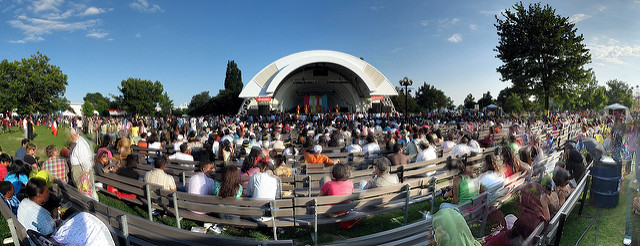
Massey Hall, one of Toronto’s iconic music venues. Music sector development officer Mike Tanner says iconic venues need to be a bigger part of our civic brand to help build music tourism.
Christy Farr
Festival organizers, musicians, and concert-goers may be able to enjoy Canadian music in Toronto this season with a lot less red-tape and tedious by-laws.
The City of Toronto has been working to make the city a music friendly place in the name of economic growth.
“We want Toronto to continue to become a more music friendly place that recognizes the value of music not just as a cultural piece but as a huge driver of economic benefit for the community at large,” said Mike Tanner, Music sector development officer at the City of Toronto.
Since the creation of the music advisory council in 2014, a 36-person team has been put together comprised of six city councillors and 30 music industry members, to make Toronto more accessible for event organizers and musicians.
The former North by Northeast music festival organizer says, Toronto is known as a very strong music scene nationally and internationally.
“Sometimes we in Toronto don’t recognize that as we should, but people come here from other places, or touring artists or promoters who do shows here are well aware of that,” said Tanner.
He says the city’s main focus is making structural changes to the way bylaws and regulations are handled in an effort to make them more music friendly.

The city is working to improve access to park permits to increase live-music outdoors.
One example is improving access to park permits to increase live music in city parks, said Tanner.
“Last summer we worked with the Municipal Licensing and Standards division on eliminating postering fines for venues that had until then been charged for postering without necessarily any evidence that the venue had in fact put the posters up,” he added.
Ongoing efforts are being made to work with the MLS and Toronto advisory counsel for a review of noise by-laws.
“Up until recently there’s no stated decibel limits, so that makes it difficult for a venue or festival for residents and for the MLS to figure out whether someone is transgressing or not,” said Tanner.
The first music festival of the season, Canadian music week, kicked off on Monday.
The festival showcases 750 bands playing for the entire week and 50 venues going every night, said Neill Dixon, president of Canadian Music Week.
Toronto lends itself well to music festivals he says.
“They are getting better all the time. There is still a lot of bureaucracy and red tape so it takes a little while to cut through all of that…I think that they have the right attitude and are making all the right moves because nothing ends overnight,” said Dixon.
Another component this year to Canadian music week is a new one day conference where city representatives from all over the world will meet to share their music city strategy and what kind of success they have had with it.
“It’s about this phenomenon that’s happening all over the world with city governments encouraging and working with the music business to try and create impactful events that draw tourism,” said Dixon.
Tanner said that Toronto follows in the footsteps of other cities such as Austin, Texas, which has branded itself as a music city.
“It’s one of the fastest growing cities in the United States because of that.”
“People move to the city because it’s known as a great entertainment capital with a vibrant cultural scene,” said Tanner.
“We have a lot of great reasons to visit Toronto, but we want to make sure that music is known as part of that,” he said.

